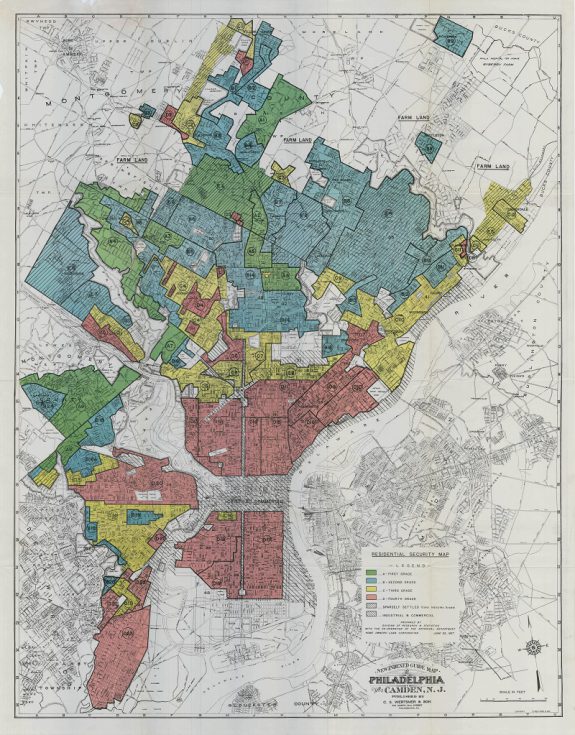Putting Philadelphia's Own House in Order: Historians and their Responsibility to Urgent Community Needs
Fifty years after the Fair Housing Act was passed, housing discrimination is alive and well in Philly, a recent article by Reveal for The Center for Investigative Reporting revealed. Jen Kinney for WHYY’s PlanPhilly investigated the situation in Philadelphia further in this article, focusing on unequal lending practices in the city; Kinney states that “Even controlling for applicants' income, loan amount, neighborhood, and other factors, blacks were 2.7 times more likely than whites to be denied a conventional mortgage in Philadelphia.” This, clearly, is an urgent community need.

The Historical Roots of Redlining
The pervasive patterns of discriminatory mortgage lending practices, known as “redlining,” reach back decades and continue to segregate cities and disrupt lives all around us. Certainly, Philadelphia is not the only city suffering from the effects of redlining, but it is a very real and historically-rooted issue that isn’t going away. Philadelphia’s present is defined at least in part by Philadelphia’s past, and its historical institutions- its “history system,” if you will- have a responsibility to make that history visible, no matter how unsavory.
Making an Impact
The impact of investigative studies like Reveal’s comes both in their ability to change legislation and change the conversation in order to correct for the dominant (illusive) narrative that we live in a post-racial time and place. Within two weeks of the study’s release, Pennsylvania’s State Treasurer, Attorney General, and the Philadelphia City Council have all announced their intention to investigate the issue. Whether that will result in real change is impossible to say, but it demonstrates the tangible power that recalling the past can have in the context of the present. Historians have a responsibility to interpret this and similar issues for a public that has to live with the societal effects. We’ve signed up to make the past relevant to people living today, and if we’re not doing that, we’re not doing our jobs.
Philadelphia’s museums and historical organizations want to reach larger audiences, but so many of them self-limit the services rendered to communities that don’t fit into a “neutral,” “apolitical” presentation of the nation’s past that is, in fact, anything but. Ted Maust suggested advocacy roles for museums in his article this week. I think this would be a desperately-needed step in the right direction. I also take GVGK Tang’s suggestion to heart that it’s worth investing in communities themselves to tell their story, particularly POC constituencies that have been the most affected by ingrained and institutionalized structural violence.
So what kind of a proposal makes sense with that goal in mind? I'll tackle that question in my next post, with the tag #loi2018.
100% of the SBD rewards from this #explore1918 post will support the Philadelphia History Initiative @phillyhistory. This crypto-experiment conducted by graduate courses at Temple University's Center for Public History and MLA Program is exploring history and empowering education. Click here to learn more.
This is outstanding Cynthia, great job! I wonder if encouraging museums and other brick-and-mortar historical institutions to move beyond their walls would be a way of improving their representation of relevant social issues like redlining. Investing in the actual communities to tell their stories, as both you and @gvgktang suggest, is definitely one excellent example for how to do that.
A beautiful arc to a powerful, relevant, historically-informed argument. Can't wait for the other shoe to drop!